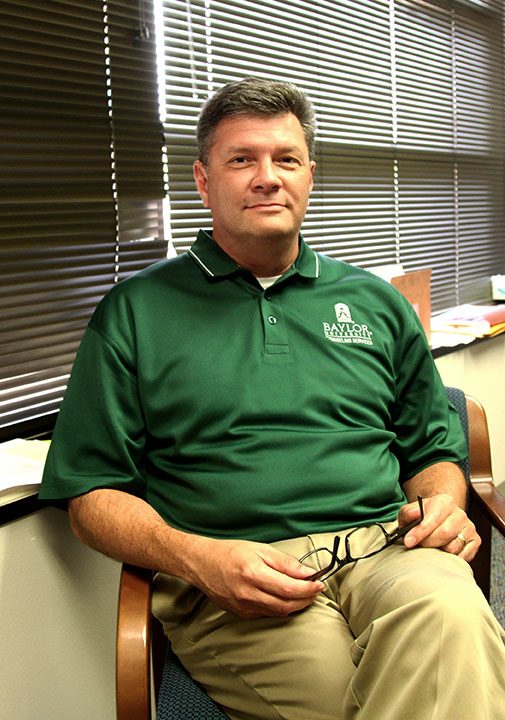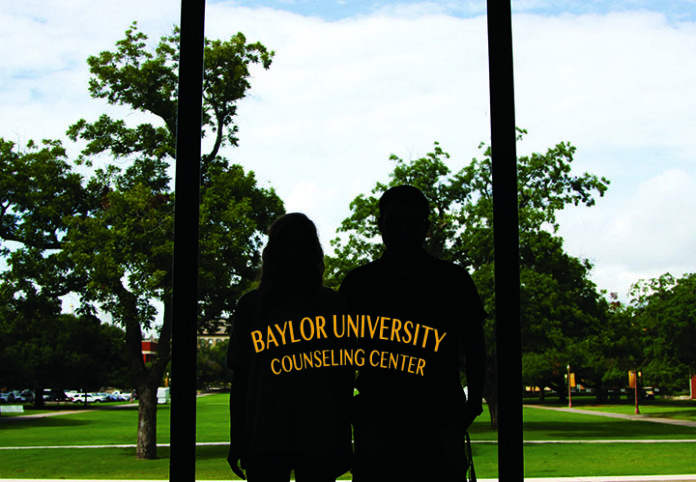By Rae Jefferson | News Editor
If there’s one thing Dr. Jim Marsh, director of Counseling Services, wants students to know, it’s that he and his staff care.
“That’s why we’re here. That’s why we’ve given years of our lives to training and education,” Marsh said. “We really do care. We know how hard it is to walk in those front doors.”
Marsh holds the reins at a pivotal time for Baylor Counseling. The department is in the process of implementing its portion of the $5 million plan to expand Baylor’s Title IX Office, Counseling Center and Department of Public Safety.
The expansion comes on the heels of the sobering Pepper Hamilton investigation that criticized the university’s handling of sexual assault cases in recent years. Some of that criticism included victims’ lack of access to counseling.
“The University will establish dedicated victim-advocacy services for students who need help navigating recovery and continued pursuit of their education after an incident of assault,” said a May 26 press release from the university following the conclusion of the Pepper Hamilton investigation.

The Counseling Services expansion will increase the number of specialized staff, expand training for current staff, provide more group counseling for victims of sexual assault and expand the department’s physical presence on campus. All of these changes are already underway.
“These improvements involve concrete, near-term opportunities we’ve identified where we can enact immediate change,” assistant director of Baylor Media Communications Tonya Lewis said to the Lariat earlier this year. “On-going assessments of our offerings and resources, along with the Pepper Hamilton report, will identify areas for longer-term improvements.”
Marsh said providing proper care comes down to one thing: resources.
“It’s not just here. Every counseling center in the country, we have ‘x’ amount of resources to do a certain amount of things. That’s really just the bottom line,” Marsh said.
Marsh said Counseling Services staff have worked hard to expand the center’s “scope of care,” or the total resources and programs available to patients. However, improving a department’s scope of care begins with recognizing its limitations. He said Baylor’s Health Center provides a good analogy for this idea.
“They have a range of care that they can provide,” he said. “There are some things that they can do, and there are some things that they can’t do and – they do what? They send you to a specialist … That’s kind of the challenge. We’ve had some limits on what we were able to provide.”
In the past, Counseling Services has been limited by time allowed per session, setting maximum numbers of sessions available to patients and not having expert staff in certain areas of care.
But Marsh said the current expansions mean fewer barriers in the future and greater care for every patient that seeks help from Counseling Services.
When Marsh first started working in the Counseling Center 17 years ago, the department consisted of three employees. Since then, staff has grown to include a wide range of health professionals and administrative personnel.
The current expansion will add another dozen new staff members to the center. The center has already welcomed seven new staffers, some of whom are trained in trauma recovery, which is useful for treating patients who have experienced stressors like car crashes, robberies and sexual assault.
Marsh said one of the new employees will act as a student advocate, specifically helping victims of sexual assault navigate through recovery.
“They have several steps to take, so [the advocate] would walk through that with them,” Marsh said.
Increasing staff means improving services to students across the board.
This year, the center will no longer set limits on the number of sessions offered to patients. In the past, patients could attend a maximum of 12 sessions each year to maximize counselors’ availability. But that limit has been removed to allow patients as much care as they need and because the center has the staff to support this change.
“We tried to make decisions on the front end about how we thought we could really help within the timeframe that we had,” Marsh said. “But that’s changed now.”
The counseling center is eliminating fees for services. Previously, the first seven sessions were offered for free, with the center charging $10 per session for the five final sessions. Now, all sessions are free of charge. The center is also extending its hours until 7 p.m. on Wednesdays and Thursdays to accommodate students’ late schedules.
Over the summer, existing counseling staff received training from Dr. Edna Foa, a leading expert in PTSD treatment. The training lasted for four days and focused on PTSD as it relates to sexual assault. Attendees were from places like the Counseling Center, School of Social Work, staff from the Family Abuse Center and personnel from the Department of Defense in San Antonio.
“She’s one of the best there is and ever has been,” Marsh said. “She wrote the book. It was a great community effort.”
Marsh said the Counseling Center is also focused on gaining more space to house its growing staff. By the spring semester, the department expects to office some of its staff out of offices in the Dutton Avenue Parking Garage.
“It’s going to be great,” Marsh said. “We’re going to have some group rooms. We’re going to have a whole section where our trauma recovery staff will be, where our advocate will be. If a student needs assistance, we’ll be able to provide it for them. It’ll be a really neat thing.”






